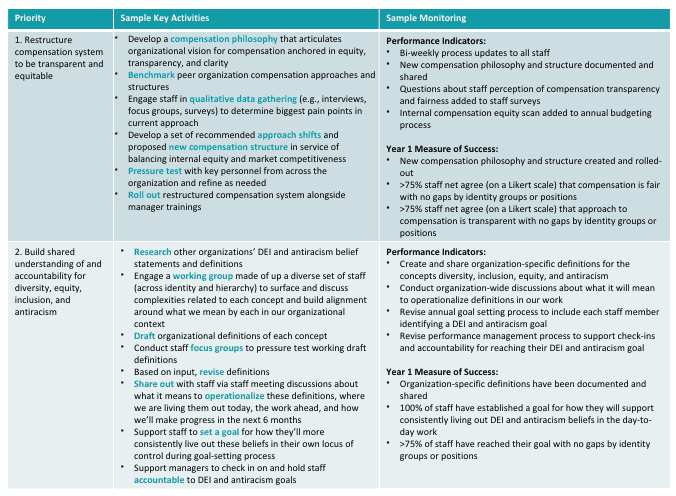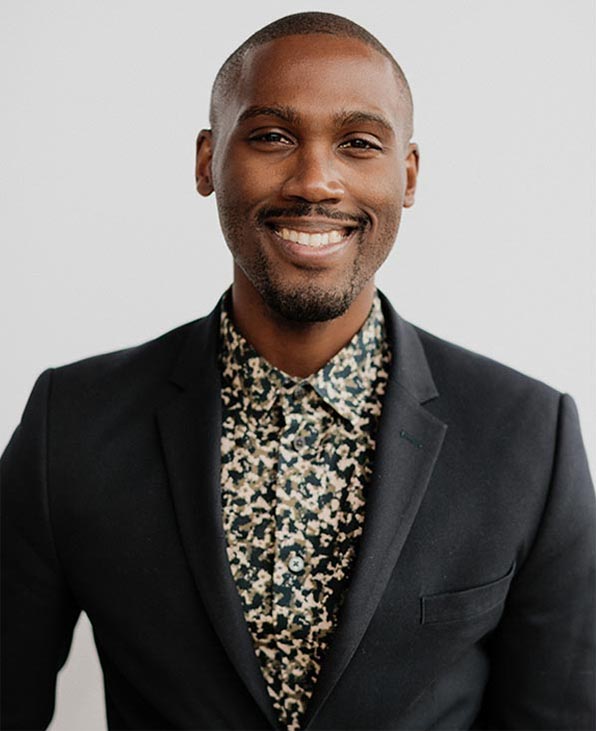Starting an optional book club for colleagues to discuss Robin DiAngelo or Ibram X. Kendi’s work. Adding Juneteenth, Ramadan or Lunar New Year to your organization’s internal calendar. Creating a DEI discussion channel on Slack. When approached thoughtfully, these actions (some of which we practice here at Promise54!) can be valuable ways to advance organizational DEI, change mindsets and teach overlooked histories. We are here to say “yes, consider these practices, and…”
Discrete low-lift activities can be a stepping stone to gain trust from a hesitant team, maintain momentum or restart after losing steam. But on the journey of meaningful progress toward organizational change and staff satisfaction, beware of conflating quick wins with deep change. Instead, tether your DEI activities to a specific and strategically selected set of priorities aimed at addressing your own organization’s challenges and enabling your staff to consistently live out your beliefs around DEI.
At Promise54 we work with many organizations who’ve gotten stuck in an over reliance on what we call “random acts of DEI.” These low-complexity activities are attractive to organizations because they involve small investments of resources and are typically straightforward to implement. But focusing on them exclusively may actually impede transformation by emphasizing superficial or cosmetic changes without fundamentally shifting the experiences of staff with historically marginalized identities or the systems and structures that surround them.
Shifting to a focus on deeper transformation isn’t just the logical next step — it’s also a research-backed way to deepen progress. According to our latest report, organizations that go beyond “random acts” and instead deeply integrate DEI as part of their ongoing work are more likely to be Advanced in staff perceptions of their DEI efforts. Priorities that we’ve seen Advanced organizations embrace include: deeply embedding their DEI beliefs into their mission and vision statements, intentionally focusing on staff diversity at all levels, and engaging staff in meaningful discussions about identity and belonging.
Over the past year, we’ve worked with twelve fully or partially virtual education organizations as part of the Remote DEI Collective. With our partners, we walked through a Multi-Year Action Planning Tool to identify critical needs and then define key priorities, activities, and monitoring to focus on over a period of 12-36 months and reevaluate yearly. While these organizations were at different stages on their journeys, this process is one we think is beneficial to all organizations seeking to deepen and operationalize their commitment to DEI. Our process utilized these prompts:
- What challenges are your organization looking to address?
- What do we want to happen? Describe the effort in details that would allow someone not engaged to understand. Connect these to your goals. What 3-4 priority areas do we plan to focus on?
- What support and/or resources do we anticipate needing to make progress on your strategies?
- How will we monitor progress? Who will be on point to drive each strategy? Who will own final decisions?
- Who will we engage as we pressure test and refine the plan? How will we engage them in the next few weeks? Throughout the process? How will we share outcomes and the rationale for decisions made across the team?
If your organization has begun to grapple with these questions and you still feel stuck, it may be time for your organization to move from the symbolic to the structural, a concept we borrow from the work of Lee Bolman and Terrence E. Deal. In other words, it’s not enough to solely focus on the symbolic: book clubs, cultural holiday celebrations, and affinity Slack channels. While these gestures might inspire and create an initial foundation for inclusion, they simply are not enough in and of themselves to produce deep, systemic change.
Answering these questions help organizations start to focus on high-leverage strategies to address substantial needs and utilize resources more efficiently. Below we’ve created a snapshot of the kinds of plans a DEI Action Planning process could generate based on organizations we’ve worked with:

“Random acts of DEI” are not bad or wrong in and of themselves, but more is needed. In fact, they are only meaningful when they are accompanied by structural shifts: having a more equitable compensation system, shifting power in decision making or reimagining a performance management system to mitigate bias. It may be time to use the energy spent on (and generated by!) symbolic activities to identify priorities and make plans that focus on deep transformation of the larger organization. Contact us if you need help.
STEPHEN PHAM
Managing Director, Organizational Operations, Culture, & Health
He/Him/His
Stephen Pham is a Managing Director, Organizational Operations, Culture, & Health at The Learning Accelerator. An experienced educator and systems leader, he brings expertise in blended and personalized learning, school design, adult learning, and data systems. At TLA, Stephen leads the organization's initiatives around diversity, equity, and inclusion, data and analytics, and organizational learning.
Before joining TLA, Stephen led school model innovation, instructional pilots, and blended learning implementation as the national Manager of Personalized Learning at Rocketship Public Schools. In his tenure, he built data systems to support blended learning and helped the network launch 4 schools across the country. Stephen started in education as a fifth-grade STEM teacher and Teach for America corps member, also serving as a BetterLesson Blended Learning Master Teacher and leading his grade level in a flex model pilot. Stephen earned a B.S. in biophysics from the University of California, Los Angeles.
Stephen is based out of Portland, OR, and enjoys reading, being active and in nature, and traveling any chance he gets.
CORNELIUS LEE
Partner
He/Him/His
Contact Cornelius: cornelius@promise54.org


